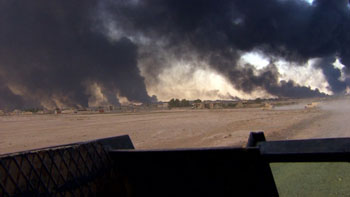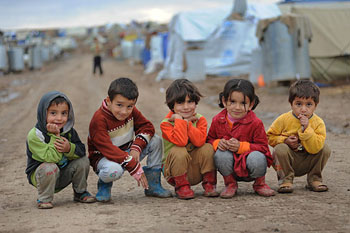By Mark Ellis

Signals on the ground suggest the retaking of Mosul from ISIS terrorists is imminent, and in their desperate attempt to ward off “infidels” they are resorting to nefarious, medieval stratagems.
Christian ministries in the region are bracing for a massive humanitarian crisis resulting from the battle for Iraq’s second-largest city — still containing over a million people.
“We believe it’s going to happen very soon, because it’s already started,” a ministry director 59 miles from Mosul told Christian Aid Mission. “It will affect the whole city. Most of them are going to be driven out, because it’s going to be a tough war. There are a lot of ISIS fighters there, and they’re preparing.”
Men and boys have been coerced to take up arms and have been installing a plethora of defenses.
“The estimated 3,500 to 5,000 ISIS fighters are also believed to have filled moats on the city’s perimeter with oil, which when set on fire would send up clouds of smoke to reduce visibility for attacking bombers,” the ministry director reported.
Military personnel have been massing in the area, including the Iraqi army, Kurdish Peshmerga fighters, 5,000 U.S. troops and, to a lesser extent, Popular Mobilization Forces. They have begun liberating smaller villages surrounding Mosul.
“The people who flee will be somebody who’s seen their husbands or kids killed or their daughters enslaved,” the director said. “We need to show them something different from how they lived under Islam.”
The population of the city of Mosul is debated; estimates range from 750,000 to 1.5 million. Before ISIS invaded in June 2014, its population was approximately 2.5 million.
As many as a million refugees may flee when the city is transformed into an urban battlefield, according to Christian Aid Mission.
“Most refugees will be women and children,” the director said. “Not everybody will be able to flee. Wherever there is most military pressure, they will try to leave, but no one knows how many ISIS will allow to leave.”
Those displaced may flee in any direction, but the ministry director said Kurdistan is the most likely option for them.

Kurdistan’s city of Erbil, where many refugees resettled after ISIS’ 2014 occupation, is the closest major center for survival, he said. Many have already walked there from Mosul, and the mostly Sunni Muslim residents of Mosul know that if they go south, they would meet with opposition from the Shiite population, according to Christian Aid Mission.
“Very few Christians remain in Mosul as most have fled or been killed,” he said, adding, “little is known about conditions or residents of Mosul because all communications have been cut.”
Conditions in Mosul under ISIS rule are said to be harsh. “We do know that people are essentially held hostage there living under sharia [Islamic law] under ISIS – whippings, cutting off hands, stoning. Anyone who thinks different from ISIS will be killed. They’ve beheaded a lot of people, killed children and women. They’ve taught children how to use weapons.”
Mosul is also suffering shortages of water, electricity, food, clothing and education, he added. While there is some conjecture about how many of the residents of Mosul might willingly defend it against the ethnic/religious mix among the Iraqi coalition, most Sunnis who thought life might be better under ISIS have seen otherwise, he said.
“Most of the people now in Mosul got burned by what they thought was going to be good,” he said. “Now they see it very clearly. Most people in Mosul are praying to God that liberation happens as soon as possible. Whether it’s Shia or the American army or others, they just want to get rid of ISIS.”
The Popular Mobilization Forces, an umbrella group of militias including mostly Shiite units, will reportedly have a minimal role in the upcoming offensive in order to reduce ISIS recruitment of Sunnis; it is also hoped that limiting their role could forestall conflicts after a victory, according to Christian Aid Mission.
Should Mosul be retaken, analysts fear a prolonged battle for control of the city with urban guerilla warfare by the various factions now uniting to liberate it.
“The military will help them to flee,” the director said. “When the military starts moving in, some people are going to start moving out. The government expects more than a million people to flee during the liberation of Mosul regardless of the results.”
The Middle East director of Christian Aid Mission, which has assisted the Iraqi ministry’s efforts to provide aid to displaced people in Erbil and Dohuk, said Christian Aid must have resources ready before refugees begin streaming out of Mosul.
“We are preparing ourselves for a scenario similar to what happened in 2014, but which could be much worse,” he said. “The United Nations shows great concern about what will happen but will be unable to meet the demands of affected people if another refugee wave shows up.”
The leader said his team is praying that they will be able to help displaced people physically, emotionally and spiritually.
“The people who flee to Kurdistan will be somebody who’s seen their husbands or kids killed or their daughters enslaved,” he said. “They will come without supplies and will sleep in the street. They’re going to have kids who haven’t eaten for days. We need to show them something different from how they lived under Islam.”
He said most of the refugees will fit into one of two categories. “They will either hate religion or be so ready to receive Christ now,” he said. “Their hearts are prepared 100 percent to receive Christ, so we’re just praying for that moment to be the first ones to receive them.”
For more about the work of Christian Aid Mission in the Middle East go here



